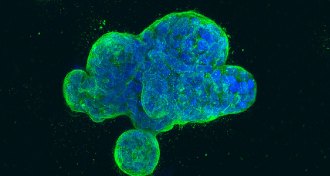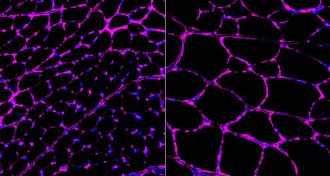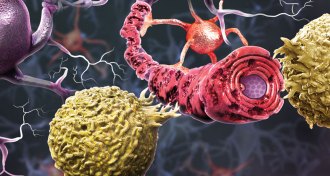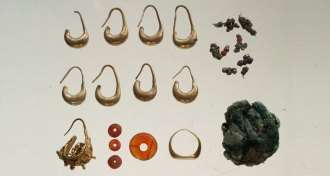Humans
Sign up for our newsletter
We summarize the week's scientific breakthroughs every Thursday.
-
 Health & Medicine
Health & MedicineZika cases are down, but researchers prepare for the virus’s return
The number of Zika cases in the Western Hemisphere have dropped this year, but the need for basic scientific and public health research of the virus remains strong.
-
 Health & Medicine
Health & MedicineWhen tumors fuse with blood vessels, clumps of breast cancer cells can spread
Breast cancer tumors may merge with blood vessels to help the cancer spread.
-
 Genetics
GeneticsCRISPR/Cas9 can reverse multiple diseases in mice
A new gene therapy uses CRISPR/Cas9 to turn on dormant genes.
-
 Health & Medicine
Health & MedicineWhat hospitals can do to help keep excess opioids out of communities
Guidelines for prescribing opioids following a routine surgery prevented thousands of unnecessary pills from leaving the hospital, a new study finds.
-
 Health & Medicine
Health & MedicineStaring into a baby’s eyes puts her brain waves and yours in sync
Brain waves line up when adults and babies lock eyes.
-
 Humans
Humans50 years ago, folate deficiency was linked to birth defects
50 years ago, scientists found that a lack of folic acid in pregnant women could cause birth defects. But now, how much is too much?
-
 Neuroscience
NeuroscienceScientists are seeking new strategies to fight multiple sclerosis
Facing so many unknowns about multiple sclerosis, researchers explore the immune system, the neurons and the gut to fight the disease.
-
 Anthropology
AnthropologyStrong-armed women helped power Europe’s ancient farming revolution
Intensive manual labor gave ancient farm women arms that female rowers today would envy.
By Bruce Bower -
 Health & Medicine
Health & MedicineTestosterone may be one reason why men don’t get asthma as much as women
Adult women have higher rates of asthma than men, and testosterone’s effect on the immune system may partly explain that difference.
-
 Archaeology
ArchaeologyHidden hoard hints at how ancient elites protected the family treasures
A secret stash at an ancient site in Israel called Megiddo illuminates the Iron Age practice of hoarding wealth.
By Bruce Bower -
 Health & Medicine
Health & MedicineStep away from the cookie dough. E. coli outbreaks traced to raw flour
Flour, though low in moisture, can sicken people with E. coli toxins if it is eaten raw.
-
 Health & Medicine
Health & MedicineSix-month-old babies know words for common things, but struggle with similar nouns
Young babies know a cup of juice from a car, but have a hard time distinguishing more similar nouns, a new study finds.